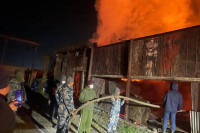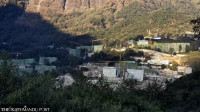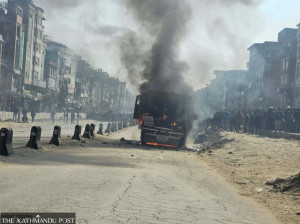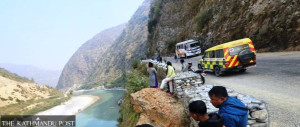Bagmati Province
Two decades after beating cancer, Durga Devi’s life becomes a story of hope
Her survival proves how awareness, early diagnosis, and regular screenings can save lives.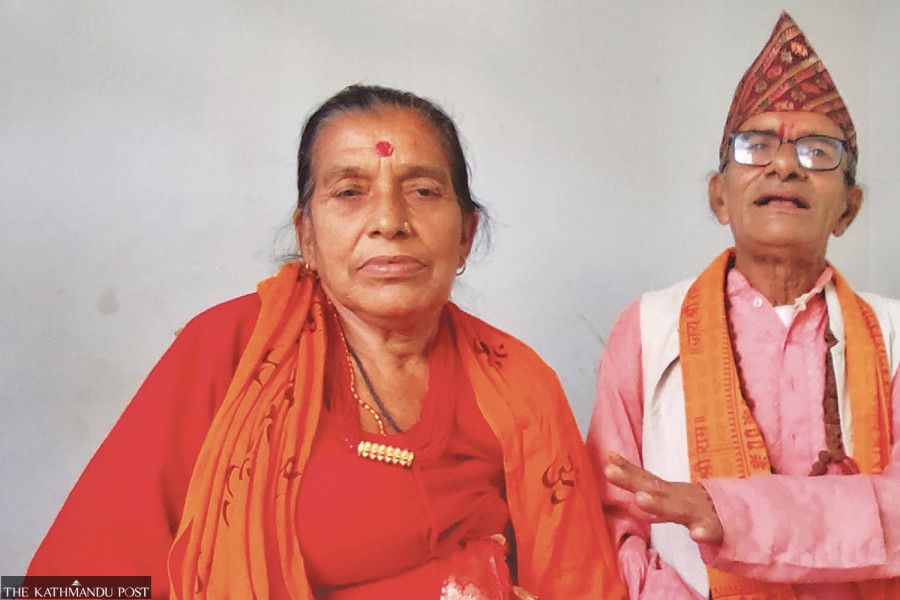
Ramesh Kumar Paudel
When Durga Devi Pudasaini of ward 2 in Hetauda Sub-Metropolitan City, Makawanpur, was diagnosed with breast cancer more than two decades ago, many around her advised against treatment. “People used to say those who get cancer don’t live long—why waste money and time?” recalls her husband, Badri Prasad Pudasaini, shaking his head. “But we chose to trust the doctors, not the rumours.”
Now, 65-year-old Durga Devi is healthy, active and grateful. Her survival is more than personal triumph—it is a story that inspires other women in her community to seek timely diagnosis and treatment.
Durga was only 36 when she first felt a lump in her left breast around 1996. “It kept growing,” she said. “We went to local clinics and even tried herbal remedies, but the pain only worsened.” Badri said they even visited faith healers. “We were desperate. Nothing worked.”
Then, in 2005, a health worker in Hetauda, Bhola Chaulagain, urged the Pudasaini couple to visit the newly opened BP Koirala Memorial Cancer Hospital in Bharatpur. Until then, they had no idea such a facility existed.
“We didn’t know there was a cancer hospital in Chitwan. Bhola sir helped us with everything—how to get there, where to go, whom to meet,” said Badri with appreciation.
Durga and Badri boarded a rickshaw at Chaubiskothi in Bharatpur. “There were no autos [autorickshaws], no microbuses, no mobile phones back then,” Badri recalls with a faint smile. “We paid 20 rupees for the ride to the hospital.”
At the hospital, they met Dr Bishwaram Paudel, along with Dr Bhaktaman Shrestha and Dr Binuma Shrestha, who confirmed the diagnosis after several tests. “When the report came, the word cancer felt like a death sentence,” Durga shared her ordeal. “Neighbours told us not to waste money on treatment. They said I’d only live a few months.”
But the doctors reassured them. “Dr Bishwaram said, ‘If you start treatment now, nothing will happen to you for at least 20 years. His words gave us courage,’” Durga recalled.
A week after Durga visited the health institution she underwent surgery to remove her cancerous breast, followed by chemotherapy and radiotherapy. The process was gruelling. “Her hair fell out, she couldn’t eat, and her body became frail,” said Badri. “At times, I feared I would lose her.”
Durga agreed. “Those months were the hardest of my life. But when the doctor said, ‘We’ve removed the root of the cancer,’ I felt new hope,” said Durga. After six difficult months, Durga began to recover. “Slowly my strength returned. I started believing that I had truly defeated it.”
For the next five years, she regularly visited Bharatpur for follow-ups, taking medicines as prescribed. “Sometimes we visited the hospital twice or thrice a year. And when the doctors finally said she was fully recovered, we felt like she was reborn,” said Badri.
Even after being declared cancer-free, Durga never stopped her annual checkups. “Once a year, I visit the hospital. I don’t want to take chances,” said Durga. Last Tuesday, Durga visited Dr Paudel again—the same doctor who had treated her 21 years ago. “When he told me everything looked fine, I felt at peace,” she added.
Dr Paudel, now the chief of the surgical oncology department at BP Koirala Memorial Cancer Hospital, says Durga’s case is an example of how early and proper treatment saves lives. “Breast cancer is curable if diagnosed on time. In the first stage, recovery is easy and quick. Even in the second or third stages, it’s treatable. But by the fourth stage, the cancer spreads to other organs, and survival rates drop sharply,” he explains.
According to him, awareness and early screening are very important. “When the hospital was launched, most patients came only in the final stages. Now, more arrive in the second and third stages. The next goal is to ensure women seek help in the first stage.”
According to Paudel, breast cancer can be detected through self-examination. “Women should check for lumps or changes in their breasts. Any abnormal discharge, indentation, or swelling in the armpit should be taken seriously. If symptoms appear, they should immediately consult certified medical professionals.” He notes that many women like Durga Devi have survived because they sought treatment early. “It’s been 21 years since her surgery, and she’s doing perfectly well. That’s the power of timely intervention,” he said.
The BP Koirala Memorial Cancer Hospital in Bharatpur remains Nepal’s leading cancer treatment center. Hospital data show that 7,009 cancer patients received treatment in 2024 alone, with 808 cases of breast cancer, making it the most common form of cancer among women.
While breast cancer primarily affects women, about one percent of cases are found in men. Last year, the hospital recorded 47 male breast cancer patients.
Nationwide data also reflect the same trend. A report by the National Cancer Registry Programme in 2020, which compiled data from 45 hospitals across Nepal, found 15,221 cancer cases, of which 1,487—including 41 men—were diagnosed with breast cancer. Breast cancer ranks second nationwide after lung cancer.




 14.12°C Kathmandu
14.12°C Kathmandu1.jpg)




